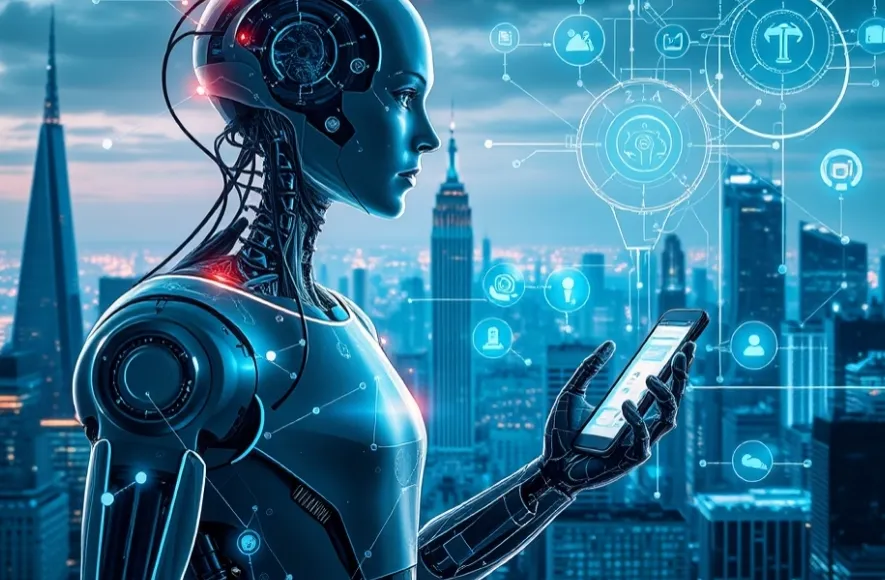
Introduction
Artificial Intelligence (AI) has rapidly evolved from a theoretical concept into a driving force behind innovation across industries. As we stand on the cusp of a new era, the future of AI is poised to offer profound transformations that will reshape societal norms, economic structures, and everyday life. This article delves into the potential advancements, challenges, and ethical considerations that will define the future landscape of AI.
Advancements in AI Technology
1. Enhanced Machine Learning Algorithms
Advancements in machine learning will continue to drive AI’s capabilities. With the advent of neural networks, particularly deep learning, AI systems are becoming increasingly adept at recognizing patterns, processing natural language, and making predictions. Future innovations may include more sophisticated algorithms that can learn with less data, leading to more efficient training processes.
2. General AI: Moving Toward Human-like Intelligence
Currently, AI excels in narrow tasks but lacks general intelligence—the ability to understand and reason across diverse domains. Research in the coming years may focus on achieving Artificial General Intelligence (AGI), where AI could potentially perform any intellectual task that a human can. This leap would revolutionize fields like healthcare, education, and autonomous systems.
3. Integration with Quantum Computing
The intersection of AI and quantum computing holds immense promise. Quantum computing’s superior processing power could exponentially increase AI’s capacity for data analysis, optimization, and problem-solving. This integrated approach will likely lead to breakthroughs in drug discovery, climate modeling, and complex system simulations.
Transformative Applications Across Industries
1. Healthcare Revolution
AI’s impact on healthcare is already significant, but the future promises even greater potential. Predictive analytics powered by AI could enhance diagnostics, personalize treatments, and streamline administrative tasks. Wearable devices integrated with AI will allow for continuous health monitoring, predicting potential issues before they become critical.
2. Autonomous Transportation
The development of autonomous vehicles is progressing rapidly. AI-driven transportation systems could reshape urban planning, reduce traffic congestion, and enhance safety. As regulatory frameworks evolve, fully autonomous public transport systems may become a reality, offering efficient and environmentally friendly alternatives to traditional vehicles.
3. Smart Cities and Infrastructure
Smart city initiatives will leverage AI to optimize resource management, improve public safety, and enhance the quality of life for residents. From predictive maintenance of infrastructure to traffic management systems that adapt in real-time, AI can make urban environments more responsive and sustainable.
Challenges Ahead
1. Ethical Concerns and Bias
As AI systems become more integrated into crucial decision-making processes, ethical considerations regarding bias and fairness become paramount. Ensuring that AI algorithms do not perpetuate existing societal biases requires transparency, diverse training data, and rigorous testing protocols. Stakeholders must prioritize ethical AI development to build trust and accountability.
2. Job Displacement and Economic Impact
The automation of tasks previously performed by humans raises concerns about job displacement. While AI will undoubtedly create new job opportunities, the transition may be challenging for workers in vulnerable positions. Developing reskilling programs and fostering a culture of lifelong learning will be essential to mitigate the adverse effects of workforce displacement.
3. Security and Privacy
The reliance on AI systems also introduces new vulnerabilities. Cybersecurity threats can exploit AI technologies, while data privacy concerns may arise from the extensive data collection required for machine learning. Striking a balance between innovation and security will be critical in reinforcing public confidence in AI.
Conclusion
The future of AI is teeming with potential, poised to revolutionize industries and transform the way we live and work. As we navigate this evolving landscape, it is imperative to address the ethical, economic, and security challenges that accompany these advancements. By fostering collaboration among technologists, policymakers, and ethicists, we can harness the power of AI to create a more prosperous and equitable future. The journey ahead will undoubtedly be complex, but with it comes the opportunity to redefine the boundaries of human capability and innovation.
